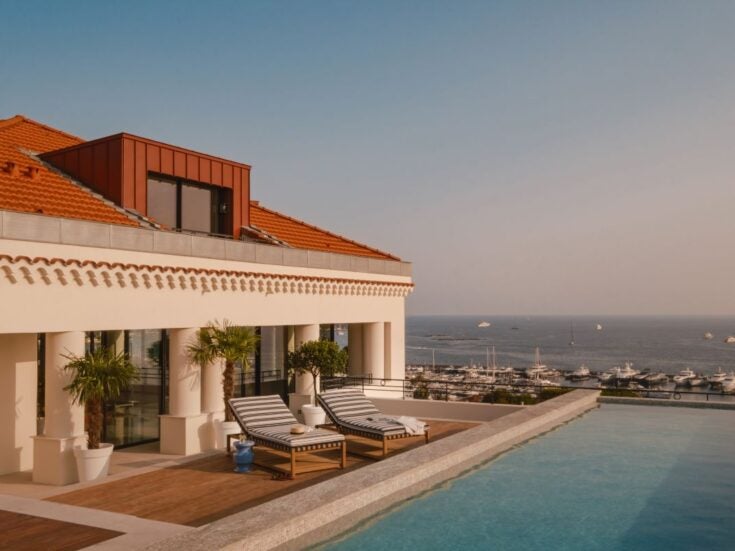
Like flares and cloche hats, all the Isle of Wight had to do was sit around and wait to become fashionable again, says Clive Aslet.
The start of 2008 has been going rather like my first car: you never knew when something vital would fly off (the distributor cap possibly, making us glide powerlessly onto the hard shoulder) or the sunroof would discharge a bucketful of rusty water over the driver’s seat. I’ll never forget the wince on the face of the AA man when the oil drained out. Ah well, so much for this year. Better go to the Isle of Wight.
My thoughts turned to that offshore English dependency, south of Southampton – for goodness sake, don’t call it part of Hampshire: my letterbox won’t be able to cope with the postbag – when I saw Luccombe Chine House. Or more specifically, a brochure from Savills. The name itself evokes the world of a Ben Travers farce.
Why Chine? I thought it was a kind of brawn from Lincolnshire, layered with parsley. (Serving suggestion: put out some really good bread and pâté de foie gras, then throw away the chine.) Actually, the Isle of Wight’s chine derives from a Saxon word meaning deep, narrow ravine. It evokes the kind of ruggedly picturesque landscape that the Victorians enjoyed. The Isle of Wight is that sort of place.
For what seems the not very extortionate price of £2.1 million, Savills will sell you what is virtually a mini-estate, seven acres with stabling, cottages, a stone-built castle folly in the grounds and a way down that ravine to the sea. As the economy wobbles, the Isle of Wight will become, I suspect, the property equivalent of comfort food. A ferry separates you, if only by 20 minutes, from the mainland; you can withdraw to recoup your energy, count your blessings (and your money) or lick your wounds. It is steeped in the nostalgia of childhood holidays. Nostalgia, when the modern world goes pearshaped, becomes the new cool.
It may be that when Paul McCartney sang ‘When I’m Sixty-Four’ on the Sergeant Pepper’s album 41 years ago, renting ‘a cottage in the Isle of Wight’ was the holiday equivalent of cardigan and slippers, evoking walks for the silver-heads in straw hats. But like other parts of the British seaside it has been busy reinventing itself recently. Cod and chips? Cape Cod more like. The Isle of Wight has been so left behind by the times that, strange to behold, it’s going upmarket. Luccombe Chine had been a hotel until it was turned back into a house seven years ago. A sign of the times if ever there was one.
The Isle of Wight had an existence before the Victorians came. There are more than a dozen respectable manor houses – quite a number for an island that is only 23 miles by thirteen. Carisbrooke Castle housed Charles I, albeit he was a reluctant guest – having made a dash for the Isle of Wight after escaping from Hampton Court in 1647, he found himself imprisoned there (a small man, he was still unable to squeeze through the bars on the windows). Fashion arrived with the Regency. There were already a number of thatched villages, and now it became the locus classicus of the cottage home – a cottage that was really a gentleman’s residence in disguise.
John Claudius Loudon, in his Encyclopaedia of Gardening, 1822, mentions a vineyard on the island. But it was the arrival of Queen Victoria and Prince Albert at Osborne, near Cowes, that set the seal on the island as a resort. The royal family loved it. The royal children had a specially constructed boat, without a hull, that they could mooch about in: to prevent them being washed away it had a net underneath. That future soldier the Duke of Connaught, was allowed to build a model fort, known as Albert Barracks. Queen Victoria’s bathing machine survives.
Not even the arrival of the poet laureate Alfred Tennyson, who rowed over to a house called Farringford, on the west of the island, in 1852, could throw a pall of gloom over the island after that. Another poet, the decadent sensualist Algernon Swinburne grew up at Bonchurch, near Luccombe Chine. That’s more like it. He liked the sea: ‘I can remember no earlier enjoyment,’ he wrote, ‘than being held up naked in my father’s arms and brandished between his hands, then shot like a stone from a sling through the air, shouting and laughing with delight, head foremost into the coming wave.’ Ventnor has been falling down its cliff with excitement ever since.
Children are, obviously enough, a primary reason for rediscovering the Isle of Wight and other seaside destinations, like the North Norfolk coast, Aldeburgh in Suffolk and the Cornish Riviera. In an increasingly pressured world, a certain sort of parent – the rich kind – wants to pass on some of the rock-pool-and-shrimping-net memories that he has harboured since his own early years. (I say he and his for the sake of old fashioned grammar. It applies just as much to mothers as well.)
Grown-ups who spent half of their working lives in airports don’t want to battle through one with their family in tow. Prosperous French and Italians pack their families off to the seaside for the summer, where the children play tennis with others de bonne famille, away from the evils of the city, while the money winner commutes up and down for weekends. The British used to do this, too – read Virginia Wolfe’s To the Lighthouse, if you can bear it. Copying the Continentals, we’ve come back to the idea, wiggling our toes in the sand with the Blackberry in our back pocket.
There has always been yachting, and yachting has always brought money. Apartments in Cowes are selling for more the £1 million now. You wouldn’t think that mega bucks had descended on Yarmouth, to judge from the unhurried people in their striped jerseys ambling along the quay. There’s a Tudor castle, a jumble of Georgian and Victorian buildings, puffin cruises advertised on the pier but, my Lord, what’s this? A restaurant with a Michelin star. Life can be sustained.
Oh give me a veranda overlooking the Solent, or even better, the Atlantic; a flag to fly, a crustacean to crack at the Crab and Lobster café, the ocean smell that comes from the ooze of green slime at Bembridge, and a scarlet-painted World War II mine collecting money for the RNLI. You can’t help feeling that the whole world is on holiday on the Isle of Wight. It’s as good a place as any to sleep out the recession.






